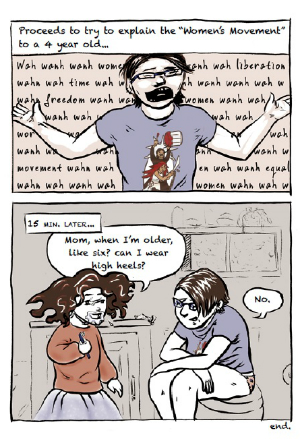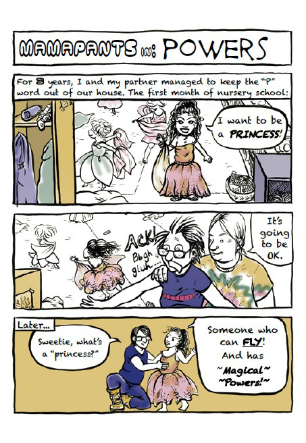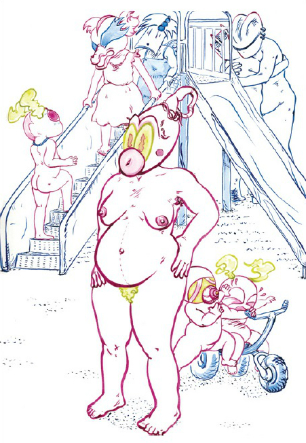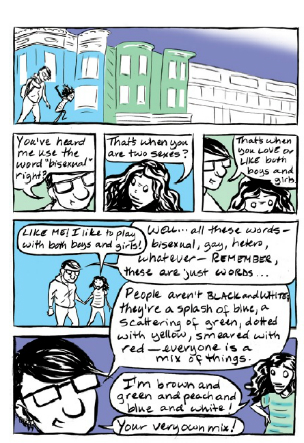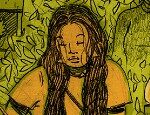In Primahood: Magenta Tyler Cohen juxtaposes slice-of-life storytelling with visual metaphor in two inter-related strands of storytelling that ostensibly sit side-by-side yet occasionally seep into each other’s narratives.
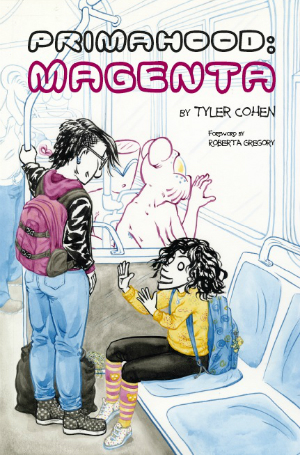 On the one hand we have the presumably autobio story of MamaPants bringing up her daughter Nene in a world of artificial social conventions. On the other we have the interspersed renditions of the world of the Primazons – a representational realm inhabited by surreally rendered characters, wherein questions of identity are relaxed and fluid.
On the one hand we have the presumably autobio story of MamaPants bringing up her daughter Nene in a world of artificial social conventions. On the other we have the interspersed renditions of the world of the Primazons – a representational realm inhabited by surreally rendered characters, wherein questions of identity are relaxed and fluid.
Each Primazon segment acts as a reflective pause between the more traditionally linear, yet episodic, tale of MamaPants and Nene whose story we follow from the latter’s conception to impending young adulthood. Through Nene’s interactions with, and explorations of, the world around her Cohen asks the readership to think about the boundaries we have constructed around our definitions of self and gender.
At the book’s core is that focus on the mother-child relationship – the thoughtful and carefully nurturing MamaPants and the energetic, questioning and engaging Nene. We examine that bond through a series of vignettes that spread across the years as Nene goes through a number of “Princess” phases (“The P-word has not gone away despite our best efforts”), becomes curious about the labels we apply to sexuality , develops an obsession with Monster High dolls (“I kind of like them and HATE them at the same time”) and begins that inexorable journey away from childhood as so poignantly symbolised at the end of the book with her first solo trip to the library.
This is a far more layered piece of work, however, than being simply a series of wittily observed familial anecdotes. Cohen uses these brief vignettes into Nene’s early years to ask the readership to question what it is to be “female”, to challenge society’s often rigid classifications of sexuality and to think about how we break down those barriers. This is a book that invites us to think not just about how we categorise ourselves but also how we allow the classifications of others to determine our sense of self.
Primahood: Magenta is all the more effective for the subtlety of that discussion; through raising those issues via the lives of characters we have become instantly invested in from its very first pages but without ever sermonising about them. Cohen allows us to rediscover society’s conventions through Nene’s eyes and to then re-evaluate them with MamaPants’s accompanying commentary, which underlines the artificiality, unfairness and illogic of those set worldviews.
That aforementioned sense of connection with the characters is heightened by Cohen’s expressive visual characterisation and an understated use of colour that seems to root events in the most recognisable of realities despite the frequent background incursions of the Primazons. Nene’s child’s eye view of her surroundings is mirrored in Cohen’s animated panel-to-panel storytelling – a reminder of that time in our lives when existence equalled constant revelations and every day was an awaiting new adventure.
In Primahood: Magenta Tyler Cohen gives us a nuanced examination of the quandaries of modern parenting; of bringing up a child in an environment where stereotypes are constantly being re-enforced and societal norms can be exclusionary and unhealthy. This is a book, though, that is also a very funny, endearingly witty and – dare I say it – a thoroughly feelgood read. Topical autobio with a surreal twist, Primahood: Magenta is the warmest of studies of the mother-child bond.
You can buy Primahood: Magenta from the Stacked Deck Press shop here priced $16.95. Tyler Cohen’s site is here and you can follow her on Twitter here.
For regular updates on all things small press follow Andy Oliver on Twitter here.





